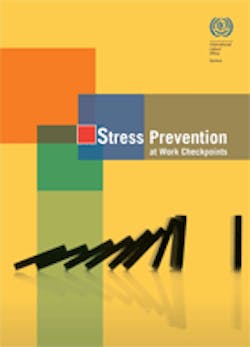New ILO Publication Helps Identify, Prevent and Address Workplace Stress
"Work-related stress is one of the most important tissues in many countries and in different kinds of workplaces. Stress has many negative impacts, including circulatory and gastrointestinal diseases, other physical problems, psychosomatic and psychosocial problems, and low productivity," the manual states.
Specialists on stress and work improvement, along with ILO staff members, outlined 50 occupational stress-prevention “checkpoints” in the manual. These checkpoints cover the categories of leadership, job demands, job control, social support, the physical working environment, work-life balance, recognition at work, protection from offensive behavior, job security and communication. The manual also includes a stress-prevention checklist.
The Why and the How
Each checkpoint covers a particular topic and explains why the checkpoint is important and how to implement it. Additional hints for each checkpoint also are included.
For example, Checkpoint 11, "Engage workers in decision-making about their work," points out that employees able to control how they do their work may be more productive and more knowledgeable. Among other action, the manual encourages employers to organize group discussions and ensure that employees can offer their ideas and suggestions at work.
Checkpoint 5, "Address workplace problems immediately when they occur," asserts that conflicts relating to occupational safety and health, personal/management issues and more can create stressors for workers. Managers and workers should cooperate to address these problems as promptly as possible, the manual states. Employers should seek any necessary technical advice, keep confidential information private and let employees know they should report any problems right away.
"Solving stress problems at work is one of the challenges to ensuring a productive and healthy working life in both industrialized and industrializing countries. This manual has been prepared to reflect the increased necessity for measures to deal with problems causing stress in the workplace," the publication states. "The actions for improvement suggested by these checkpoints are also based on a number of underlying principles that have proven to be practicable and applicable in real workplaces."
ILO released "Stress Prevention at Work Checkpoints: Practical Improvements for Stress Prevention in the Workplace" in January. Download the manual as a PDF here.
About the Author

Laura Walter
Laura Walter was formerly senior editor of EHS Today. She is a subject matter expert in EHS compliance and government issues and has covered a variety of topics relating to occupational safety and health. Her writing has earned awards from the American Society of Business Publication Editors (ASBPE), the Trade Association Business Publications International (TABPI) and APEX Awards for Publication Excellence. Her debut novel, Body of Stars (Dutton) was published in 2021.
